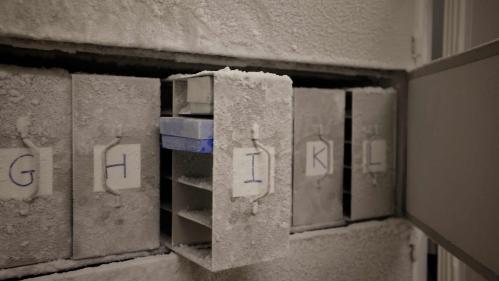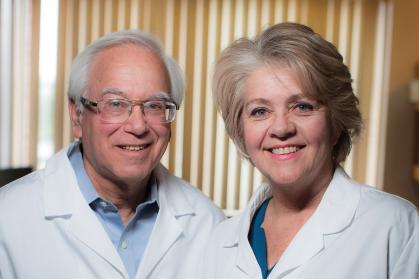A Global Microbiome Preservation Effort Enters Its Growth Phase

Rutgers scientists leading a “microbial Noah’s Ark” announce the creation of ethical rules for fair collaboration and ownership
A global effort to create a “microbial Noah’s Ark” to preserve the world’s diverse collection of healthy microbes before they disappear is now entering an active growth phase.
In a perspective article published in Nature Communications, a team of 25 scientists involved in the formation of the Microbiota Vault Initiative reported their successes and also laid out an ethical framework to ensure equitable collaboration and depositor sovereignty. This set of principles is designed to guide the initiative in its mission to safeguard microbial diversity for future generations.
The announcement, which coincides with World Microbiome Day on June 27, marks a significant step forward in a global effort. Scientists founding the initiative in 2018 were inspired by The Seed Vault within the Arctic Circle in Svalbard, Norway, where seeds collected worldwide are safeguarded to ensure the preservation of genetic diversity in the event of a global crisis.

“The Microbiota Vault Initiative represents a proactive effort to protect and preserve the microbial life that is essential for the health of our planet and its inhabitants,” said Maria Gloria Dominguez-Bello, president of the initiative and Distinguished Professor in the Department of Biochemistry and Microbiology at the Rutgers School of Environmental and Biological Sciences. “Through global collaboration and ethical governance, Rutgers University is contributing to safeguarding Earth's microbial heritage.” She also serves as the Henry Rutgers Professor of Microbiome and Health and as Professor of Anthropology at the Rutgers School for Arts and Sciences.
Microbes – tiny living organisms such as bacteria, viruses and fungi – exist everywhere, including in our bodies, where they form communities known as microbiomes. Recent research has highlighted the crucial role of "good microbes" in maintaining human health by aiding digestion, bolstering the immune system and protecting against harmful invaders.
Plants, food and the environment also have microbiomes. For example, soil microbes help plants grow by cycling nutrients and fermented foods such as yogurt contain beneficial bacteria that support gut health. Environmental microbiomes, such as those in the Arctic permafrost, play vital roles in regulating climate by controlling greenhouse gas emissions.
Microbiomes are being threatened by human activities that disrupt their natural balance, according to research by Dominguez-Bello. In humans, the overuse of antibiotics, cesarean sections and formula feeding can reduce the diversity of gut microbes, leading to increased risks of allergies, autoimmune diseases and metabolic disorders. In food, the excessive use of preservatives and additives can harm beneficial microbes.
“The microbiome is under big threat, a threat that is in many ways analogous to climate change,” said Martin Blaser, a member of the board of directors for the initiative, and director of Rutger's Center for Advanced Biotechnology and Medicine and a co-author of the perspective. “Human activities are depleting our microbiome, and there's lots of evidence of that.”
For plants, unsustainable agricultural practices, such as heavy pesticide use, can destroy soil microbiomes essential for nutrient cycling and plant health, Blaser said. Environmental microbiomes are affected by pollution, climate change and habitat destruction, which can lead to the loss of microbes that regulate greenhouse gas emissions and maintain ecosystem stability.
The idea of the initiative is to support efforts to identify healthy microbes, store them and freeze them before they disappear, said Blaser, who also is the Henry Rutgers Chair of the Human Microbiome and a professor of medicine and of pathology and laboratory medicine at Rutgers Robert Wood Johnson Medical School.
“It’s very much a long-term project,” said Blaser, “because maybe 100 years from now, having saved these microbes could prevent a major disaster.
During the now-completed pilot phase, scientists in the Initiative marked several milestones, Dominguez-Bello said. They collected more than 2,000 fecal specimens and samples of fermented food from various nations. The effort grew from a handful of scientists, from a sprinkling of nations to over 100 researchers from 32 countries. Microbial samples are stored temporarily in cryogenic conditions at the Institute of Medical Microbiology at the University of Zurich.
In the next phase of the initiative, which Dominguez-Bello refers to as “Growth Phase 1” and runs to 2029, scientists will expand the collection to 10,000 samples and actively seek government funding beyond their present philanthropic and university support. Plans are underway to establish a permanent site for the vault, with potential locations being considered in Switzerland, Canada and other locales with cold climates.
The ethical framework of the initiative outlined in the paper is designed to ensure that the preservation of microbial diversity is conducted in a fair, respectful and inclusive manner. “We are absolutely committed to developing the Microbiota Vault in a way that maximizes equity around the world,” Dominguez-Bello said.
Some key abiding principles include depositor sovereignty, equitable collaboration and ethical governance. The original collectors will retain ownership and control over their microbial samples. The initiative will emphasize the importance of respecting local knowledge and ensuring that any benefits are shared fairly. In addition, ethical considerations will be prioritized, including the rights of indigenous communities and the need for transparent and inclusive decision-making processes.
Some enabling technologies to take full advantage of the collection don’t yet exist, but scientists working on the initiative envision a time when the samples may be used to develop new medical treatments, improve agricultural practices and restore damaged ecosystems.
“We believe that one day the science will improve sufficiently so that we will have really good restorative techniques,” Blaser said. “But if it is too late, and key members of the microbiome are gone, like the dodo bird, we can’t restore them, unless we have them safely stored away.”
Explore more of the ways Rutgers research is shaping the future




